- Home
- Albert Camus
Resistance, Rebellion, and Death Page 5
Resistance, Rebellion, and Death Read online
Page 5
That objective mind would be right. For the coexistence, in certain minds, of a philosophy of negation and a positive morality illustrates, in fact, the great problem that is painfully disturbing the whole epoch. In a word, it is a problem of civilization, and it is essential for us to know whether man, without the help either of the eternal or of rationalistic thought, can unaided create his own values. Such an undertaking goes infinitely beyond all of us. I say this because I believe it: France and Europe must now create a new civilization or else perish.
But civilizations are not built by rapping people on the knuckles. They are built up by the confrontation of ideas, by the blood of the spirit, by suffering and courage. It is not possible that concepts which have belonged to Europe for the past hundred years should be judged in the twinkling of an eye, in L’Aube, by an editorialist who, without hesitation, attributes to Nietzsche a lustful appetite and to Heidegger the idea that existence is useless. I do not have much liking for the too famous existential philosophy, and, to tell the truth, I think its conclusions false. But at least it represents a great adventure of the mind, and it is hard to see it subjected, by M. Rabeau, to the judgment of the most shortsighted conformism.
In reality, such concepts and such undertakings are not judged at this moment according to the rules of objectivity. They are judged not according to facts but according to a doctrine. Our Communist comrades and our Christian comrades talk to us from the vantage point of doctrines we respect. Their doctrines are not ours, but it has never occurred to us to talk of them in the tone they have just used toward us and with the assurance they show. Let us pursue then, insofar as we can, our experience and our thought. M. Rabeau blames us for having an audience. I believe that is an exaggeration. But this at least is true: the uneasiness that concerns us belongs to a whole epoch from which we do not want to dissociate ourselves. We want to think and live in our history. We believe that the truth of this age can be found only by living through the drama of it to the very end. If the epoch has suffered from nihilism, we cannot remain ignorant of nihilism and still achieve the moral code we need. No, everything is not summed up in negation and absurdity. We know this. But we must first posit negation and absurdity because they are what our generation has encountered and what we must take into account.
The men who are indicted in these articles are loyally attempting both in their work and in their lives to solve this problem. Is it so hard to realize that one cannot settle in a few lines a question others are not sure of solving when they devote themselves to it altogether? Can’t they be granted the patience that is granted to any sincere undertaking? Isn’t it possible to address them more humbly?
I shall end this protest here. I hope I have been restrained. But I should like my indignation to be felt. Objective criticism is the best of things, in my opinion, and I can’t object when someone says that a work is bad or that a philosophy is not good for man’s fate. It is only fair that writers should answer for their writings. That forces them to reflect, and we all have a dreadful need to reflect. But deriving from such principles judgments as to this or that mind’s disposition toward slavery, especially when you have proof of the contrary, and concluding that this or that line of thought must necessarily lead to Nazism suggests an image of man which I prefer not to qualify and constitutes very paltry proof of the moral advantages of optimistic philosophy.
COMBAT, September 1945
DEFENSE OF INTELLIGENCE
(Speech given at the meeting organized by L’Amitié Française on 15 March 1945)
IF THE kind of French friendship with which we are concerned were to be but an effusion of feeling among people who get along together, I should not count on it. That would be the easiest, but also the least useful, form of friendship. And I suppose that the people who founded this society called L’Amitié Française wanted something else—a more difficult form of friendship that calls for effort. In order to avoid yielding to facility and indulging in self-congratulation, I should like, in the ten minutes allotted me, merely to point out the difficulties of such an undertaking. I could not possibly do this more effectively than by speaking of what always stands in the way of friendship—in other words, falsehood and hatred.
We shall indeed not accomplish anything for French friendship if we cannot get rid of falsehood and hatred. In a way, we have certainly not got rid of them. We have been learning their lessons for too long now. And perhaps the last and most long-lived victory of Hitlerism is to be found in the shameful scars made on the hearts of those who fought Hitlerism most vigorously. How could it be otherwise? For years now, this world has been subjected to an unparalleled outbreak of hatred. For four years we witnessed here at home the reasoned expression of that hatred. Men like you and me who in the morning patted children on the head would a few hours later become meticulous executioners. Such men became the bureaucrats of hatred and torture. For four years their administration functioned by creating villages of orphans, by shooting men’s faces full of holes so that they would not be recognized, by jamming and stamping children’s bodies into coffins too small for them, by torturing brothers in their sisters’ presence, by shaping cowards as in a mold, and by destroying the proudest of souls. It seems that such stories are not believed abroad. But for four years, in our anguish, we could not avoid believing them. Every morning for four years each Frenchman received his ration of hatred and his slap in the face—when he opened his newspaper. Necessarily, some of that has remained with us. We were left with hatred. We were left with the impulse that the other day in Dijon made a fourteen-year-old child fall upon a collaborator who had been lynched and disfigure his face. We were left with the rage that consumes our souls at the memory of certain images and certain faces. The executioners’ hatred engendered the victims’ hatred. And once the executioners had gone, the French were left with their hatred only partially spent. They still look at one another with a residue of anger.
Well, this is what we must overcome first of all. Our poisoned hearts must be cured. And the most difficult battle to be won against the enemy in the future must be fought within ourselves, with an exceptional effort that will transform our appetite for hatred into a desire for justice. Not giving in to hatred, not making any concessions to violence, not allowing our passions to become blind—these are the things we can still do for friendship and against Hitlerism. Even today certain newspapers still indulge in violence and insult. But that is simply still giving in to the enemy. Instead, it is essential that we never let criticism descend to insult; we must grant that our opponent may be right and that in any case his reasons, even though bad, may be disinterested. It is essential, in short, that we remake our political mentality.
What does this mean, if we stop to think about it? It means that we must save intelligence. A few years ago, when the Nazis had just seized power, Goering gave a fair idea of their philosophy by declaring: “When anyone talks to me of intelligence, I take out my revolver.” And that philosophy was not limited to Germany. At the same time throughout civilized Europe the excesses of intelligence and the faults of the intellectual were being pointed out. Intellectuals themselves, by an interesting reaction, were not the last to join the attack. Everywhere philosophies of instinct were dominant and, along with them, the spurious romanticism that prefers feeling to understanding as if the two could be separated. Since then intelligence has regularly been blamed. The war came and then the defeat. Vichy taught us that the chief responsibility lay with the intelligence. Our peasants had read too much Proust. And everyone knows that Paris-Soir, Fernandel, and trade-association banquets are signs of intelligence. It seems that the mediocrity of her leaders which was killing France had its source in books.
Even now intelligence is ill-treated. This proves simply that the enemy is not yet conquered. If you merely make an effort to understand without preconceptions, if you merely talk of objectivity, you will be accused of sophistry and criticized for having pretensions. No, we can’t have that! That is what
must be reformed. For I know as well as anyone the excesses of intelligence, and I know as well as anyone that the intellectual is a dangerous animal ever ready to betray. But that is not the right kind of intelligence. We are speaking of the kind that is backed by courage, the kind that for four years paid whatever was necessary to have the right to respect. When that intelligence is snuffed out, the black night of dictatorship begins. This is why we must maintain it with all its duties and all its rights. At that price, and only at that price, will French friendship have a meaning. For friendship is a knowledge acquired by free men. And there is no freedom without intelligence or without mutual understanding.
In conclusion, I shall speak directly to you students who are gathered here. I am not one to preach virtue to you. Too many Frenchmen confuse virtue with bloodlessness. If I had any right to do so, I should rather preach the passions to you. But I should like those who will represent French intelligence in the future to be resolved at least never to yield on one or two points. I should like them not to give in when they are told that intelligence is always unwelcome or that it is permissible to lie in order to succeed. I should like them not to give in to guile, to violence, or to inertia. Then perhaps a French friendship will be possible that will be more than idle talk. Then perhaps, in a nation that is free and passionately attached to truth, man will begin again to have that feeling for man, without which the world can never be but a vast solitude.
The Unbeliever and Christians
(Fragments of a statement made at the Dominican Monastery of Latour-Maubourg in 1948)
INASMUCH as you have been so kind as to invite a man who does not share your convictions to come and answer the very general question that you are raising in these conversations, before telling you what I think unbelievers expect of Christians, I should like first to acknowledge your intellectual generosity by stating a few principles.
First, there is a lay pharisaism in which I shall strive not to indulge. To me a lay pharisee is the person who pretends to believe that Christianity is an easy thing and asks of the Christian, on the basis of an external view of Christianity, more than he asks of himself. I believe indeed that the Christian has many obligations but that it is not up to the man who rejects them himself to recall their existence to anyone who has already accepted them. If there is anyone who can ask anything of the Christian, it is the Christian himself. The conclusion is that if I allowed myself at the end of this statement to demand of you certain duties, these could only be duties that it is essential to ask of any man today, whether he is or is not a Christian.
Secondly, I wish to declare also that, not feeling that I possess any absolute truth or any message, I shall never start from the supposition that Christian truth is illusory, but merely from the fact that I could not accept it. As an illustration of this position, I am willing to confess this: Three years ago a controversy made me argue against one among you, and not the least formidable. The fever of those years, the painful memory of two or three friends assassinated had given me the courage to do so. Yet I can assure you that, despite some excessive expressions on the part of François Mauriac, I have not ceased meditating on what he said. At the end of this reflection—and in this way I give you my opinion as to the usefulness of the dialogue between believer and unbeliever—I have come to admit to myself, and now to admit publicly here, that for the fundamentals and on the precise point of our controversy François Mauriac got the better of me.
Having said that, it will be easier for me to state my third and last principle. It is simple and obvious. I shall not try to change anything that I think or anything that you think (insofar as I can judge of it) in order to reach a reconciliation that would be agreeable to all. On the contrary, what I feel like telling you today is that the world needs real dialogue, that falsehood is just as much the opposite of dialogue as is silence, and that the only possible dialogue is the kind between people who remain what they are and speak their minds. This is tantamount to saying that the world of today needs Christians who remain Christians. The other day at the Sorbonne, speaking to a Marxist lecturer, a Catholic priest said in public that he too was anticlerical. Well, I don’t like priests who are anticlerical any more than philosophies that are ashamed of themselves. Hence I shall not, as far as I am concerned, try to pass myself off as a Christian in your presence. I share with you the same revulsion from evil. But I do not share your hope, and I continue to struggle against this universe in which children suffer and die.
And why shouldn’t I say here what I have written elsewhere? For a long time during those frightful years I waited for a great voice to speak up in Rome. I, an unbeliever? Precisely. For I knew that the spirit would be lost if it did not utter a cry of condemnation when faced with force. It seems that that voice did speak up. But I assure you that millions of men like me did not hear it and that at that time believers and unbelievers alike shared a solitude that continued to spread as the days went by and the executioners multiplied.
It has been explained to me since that the condemnation was indeed voiced. But that it was in the style of the encyclicals, which is not at all clear. The condemnation was voiced and it was not understood! Who could fail to feel where the true condemnation lies in this case and to see that this example by itself gives part of the reply, perhaps the whole reply, that you ask of me. What the world expects of Christians is that Christians should speak out, loud and clear, and that they should voice their condemnation in such a way that never a doubt, never the slightest doubt, could rise in the heart of the simplest man. That they should get away from abstraction and confront the blood-stained face history has taken on today. The grouping we need is a grouping of men resolved to speak out clearly and to pay up personally. When a Spanish bishop blesses political executions, he ceases to be a bishop or a Christian or even a man; he is a dog just like the one who, backed by an ideology, orders that execution without doing the dirty work himself. We are still waiting, and I am waiting, for a grouping of all those who refuse to be dogs and are resolved to pay the price that must be paid so that man can be something more than a dog.
And now, what can Christians do for us?
To begin with, give up the empty quarrels, the first of which is the quarrel about pessimism. I believe, for instance, that M. Gabriel Marcel would be well advised to leave alone certain forms of thought that fascinate him and lead him astray. M. Marcel cannot call himself a democrat and at the same time ask for a prohibition of Sartre’s play. This is a position that is tiresome for everyone. What M. Marcel wants is to defend absolute values, such as modesty and man’s divine truth, when the things that should be defended are the few provisional values that will allow M. Marcel to continue fighting someday, and comfortably, for those absolute values.…
By what right, moreover, could a Christian or a Marxist accuse me, for example, of pessimism? I was not the one to invent the misery of the human being or the terrifying formulas of divine malediction. I was not the one to shout Nemo bonus or the damnation of unbaptized children. I was not the one who said that man was incapable of saving himself by his own means and that in the depths of his degradation his only hope was in the grace of God. And as for the famous Marxist optimism! No one has carried distrust of man further, and ultimately the economic fatalities of this universe seem more terrible than divine whims.
Christians and Communists will tell me that their optimism is based on a longer range, that it is superior to all the rest, and that God or history, according to the individual, is the satisfying end-product of their dialectic. I can indulge in the same reasoning. If Christianity is pessimistic as to man, it is optimistic as to human destiny. Well, I can say that, pessimistic as to human destiny, I am optimistic as to man. And not in the name of a humanism that always seemed to me to fall short, but in the name of an ignorance that tries to negate nothing.
This means that the words “pessimism” and “optimism” need to be clearly defined and that, until we can do so, we must pay attention to what u
nites us rather than to what separates us.
That, I believe, is all I had to say. We are faced with evil. And, as for me, I feel rather as Augustine did before becoming a Christian when he said: “I tried to find the source of evil and I got nowhere.” But it is also true that I, and a few others, know what must be done, if not to reduce evil, at least not to add to it. Perhaps we cannot prevent this world from being a world in which children are tortured. But we can reduce the number of tortured children. And if you don’t help us, who else in the world can help us do this?
Between the forces of terror and the forces of dialogue, a great unequal battle has begun. I have nothing but reasonable illusions as to the outcome of that battle. But I believe it must be fought, and I know that certain men at least have resolved to do so. I merely fear that they will occasionally feel somewhat alone, that they are in fact alone, and that after an interval of two thousand years we may see the sacrifice of Socrates repeated several times. The program for the future is either a permanent dialogue or the solemn and significant putting to death of any who have experienced dialogue. After having contributed my reply, the question that I ask Christians is this: “Will Socrates still be alone and is there nothing in him and in your doctrine that urges you to join us?”
It may be, I am well aware, that Christianity will answer negatively. Oh, not by your mouths, I am convinced. But it may be, and this is even more probable, that Christianity will insist on maintaining a compromise or else on giving its condemnations the obscure form of the encyclical. Possibly it will insist on losing once and for all the virtue of revolt and indignation that belonged to it long ago. In that case Christians will live and Christianity will die. In that case the others will in fact pay for the sacrifice. In any case such a future is not within my province to decide, despite all the hope and anguish it awakens in me. I can speak only of what I know. And what I know—which sometimes creates a deep longing in me—is that if Christians made up their minds to it, millions of voices—millions, I say—throughout the world would be added to the appeal of a handful of isolated individuals who, without any sort of affiliation, today intercede almost everywhere and ceaselessly for children and for men.

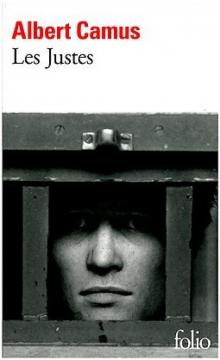 Les Justes
Les Justes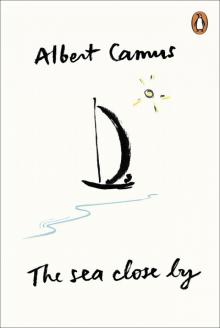 The Sea Close By
The Sea Close By The Stranger
The Stranger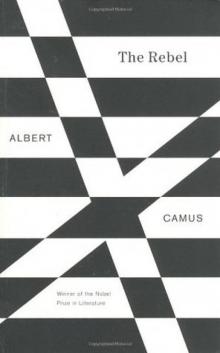 The Rebel: An Essay on Man in Revolt
The Rebel: An Essay on Man in Revolt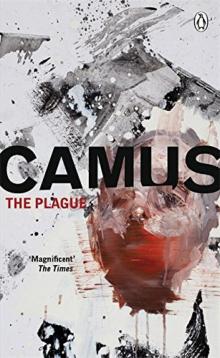 The plague
The plague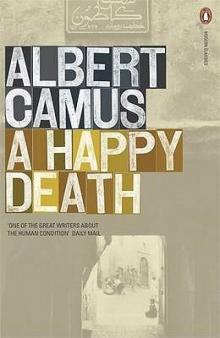 A Happy Death
A Happy Death The Myth of Sisyphus and Other Essays
The Myth of Sisyphus and Other Essays The Fall
The Fall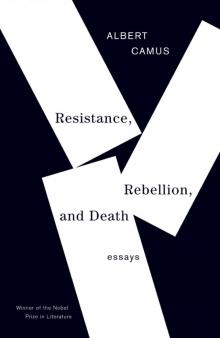 Resistance, Rebellion, and Death
Resistance, Rebellion, and Death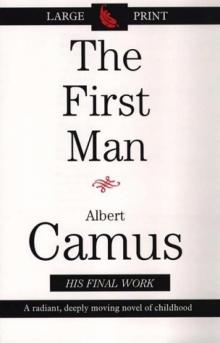 The First Man
The First Man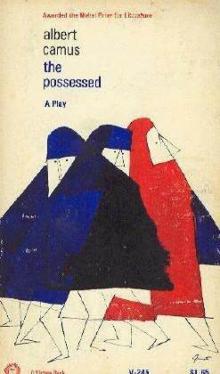 The Possessed
The Possessed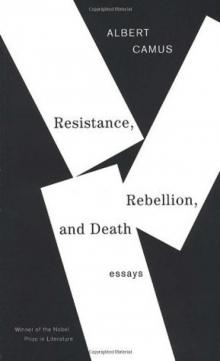 Resistance, Rebellion and Death: Essays
Resistance, Rebellion and Death: Essays